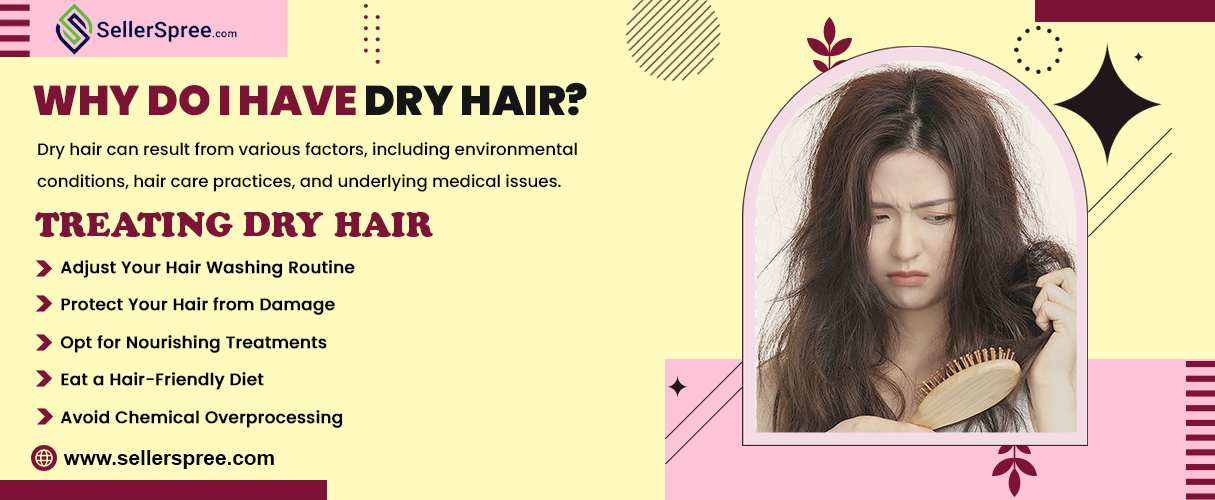
Shop Now: www.sellerspree.com
Dry hair can result from various factors, including environmental conditions, hair care practices, and underlying medical issues. Understanding the causes can help you address this concern effectively and restore moisture, shine, and health to your hair.
Dry hair occurs when your hair lacks sufficient moisture or struggles to retain it. This deficiency compromises the outer layer of your hair, making it appear dull, frizzy, and unhealthy. While dry hair can affect individuals of all ages and genders, it is more common as you grow older.
Causes of Dry Hair
Environmental Factors
Environmental conditions often play a significant role in drying out your hair. Some contributing factors include:
- Living in hot, arid climates with low humidity
- Excessive exposure to sunlight or strong winds
- Regular swimming in chlorinated pools or saltwater
Improper Hair Care Habits
Certain hair care practices can strip your hair of its natural oils and lead to dryness:
- Frequent washing: Washing your hair too often can strip it of essential natural oils, leading to dryness.
- Harsh products: Using shampoos, conditioners, or styling products with sulfates or alcohols can damage your hair.
- Chemical treatments: Overuse of hair dyes, relaxers, or perms can weaken your hair’s cuticle, causing dryness.
- Heat styling tools: Regular use of hair dryers, flat irons, or curling wands exposes your hair to high temperatures, which can damage its natural moisture barrier.
Underlying Medical Conditions
Some health issues can also impact your hair’s ability to stay hydrated. These include:
- Hypothyroidism: An underactive thyroid gland can lead to dry, brittle hair, along with other symptoms like fatigue and weight gain.
- Hypoparathyroidism: This condition results in low calcium levels, which are essential for healthy hair.
- Anorexia nervosa: Malnutrition caused by this eating disorder deprives your hair of the nutrients it needs, causing it to become dry and brittle.
- Menkes syndrome: This rare genetic disorder inhibits copper absorption, which is critical for hair health, leading to dryness and breakage.
Diagnosing Dry Hair
If your hair remains persistently dry despite changes to your routine, it may be time to consult a medical professional or dermatologist. During an appointment, they may:
- Ask about your hair care habits, diet, and lifestyle.
- Perform a scalp and hair examination.
- Conduct blood or urine tests to detect conditions such as hypothyroidism, hypoparathyroidism, or nutritional deficiencies.
A thorough diagnosis can help uncover any underlying causes and guide the treatment process.
Treating Dry Hair
Most cases of dry hair can be managed with changes to your daily routine and hair care practices. Here are some effective remedies:
Adjust Your Hair Washing Routine
- Wash your hair less frequently — aim for once or twice a week to allow natural oils to nourish your scalp and strands.
- Use a gentle shampoo and conditioner designed for dry or damaged hair. Look for sulfate-free and moisturizing products.
- Always condition your hair after washing to replenish moisture.
Protect Your Hair from Damage
- Avoid heat styling tools like blow dryers, flat irons, and curling wands whenever possible. Let your hair air-dry instead.
- If you must use heat tools, apply a heat protectant spray beforehand to minimize damage.
- Wear a hat or scarf to shield your hair from direct sunlight and harsh weather.
- Use a swim cap when swimming to protect your hair from chlorine or saltwater.
Opt for Nourishing Treatments
- Incorporate deep-conditioning treatments or hair masks into your routine at least once a week. Ingredients like argan oil, coconut oil, or shea butter can help restore moisture.
- Try leave-in conditioners or serums to combat frizz and add softness.
- Apply a lightweight hair oil to your strands for extra hydration and shine.
Eat a Hair-Friendly Diet
Your hair’s health is closely tied to your nutrition. Include foods rich in:
- Protein: Found in eggs, nuts, and fish, protein strengthens hair strands.
- Omega-3 fatty acids: Found in salmon, walnuts, and chia seeds, these help moisturize your scalp.
- Vitamins and minerals: Zinc, biotin, and iron are crucial for promoting healthy hair growth.
Avoid Chemical Overprocessing
Reduce the frequency of chemical treatments such as hair coloring, perms, or straightening. If you color your hair, try semi-permanent dyes or natural alternatives like henna, which are gentler on your strands.
When to See a Doctor
If your dry hair persists despite these efforts, or if you notice additional symptoms like hair thinning or excessive breakage, consult a healthcare professional. An underlying medical condition could be contributing to your hair dryness. Treating these conditions can improve your hair health in the long run.
Conclusion
Dry hair is a common concern, but with the right care and lifestyle adjustments, it is manageable. By improving your hair care habits, protecting it from environmental stressors, and nourishing it with the right products and nutrients, you can restore its natural moisture, shine, and strength.
If you’re looking for high-quality hair care products to combat dryness and improve overall hair health, explore Sellerspree.com. We offer a wide range of hair care and hair color products from trusted brands, catering to all hair types and concerns. Find the perfect products to keep your hair hydrated, healthy, and beautiful!
Tags: Dry Hair, Dry Hair Causes, Dry Hair Diagnosing, Dry Hair Treating, SellerSpree, Hair Health, Hair Care Routine, Dry Hair Solutions, Healthy Hair Routine, Hair Treatment, Moisturized Hair, Frizz Free, Beauty Tips, Hair Love, Glowing Hair, Hydrated Hair, Hair Products, Hair Tips for Women, Hair Care Products, Permanent Hair Color, Hair Shampoo, Hair Color, Beauty Products, Beauty Supplies, Salon Supplies, Cosmetologist Supplies, Cosmetics, Hairspray, Creams, Moisturizer, Serum, USA, Canada, Sell on Amazon, Sell on Ebay, Sell on Walmart
